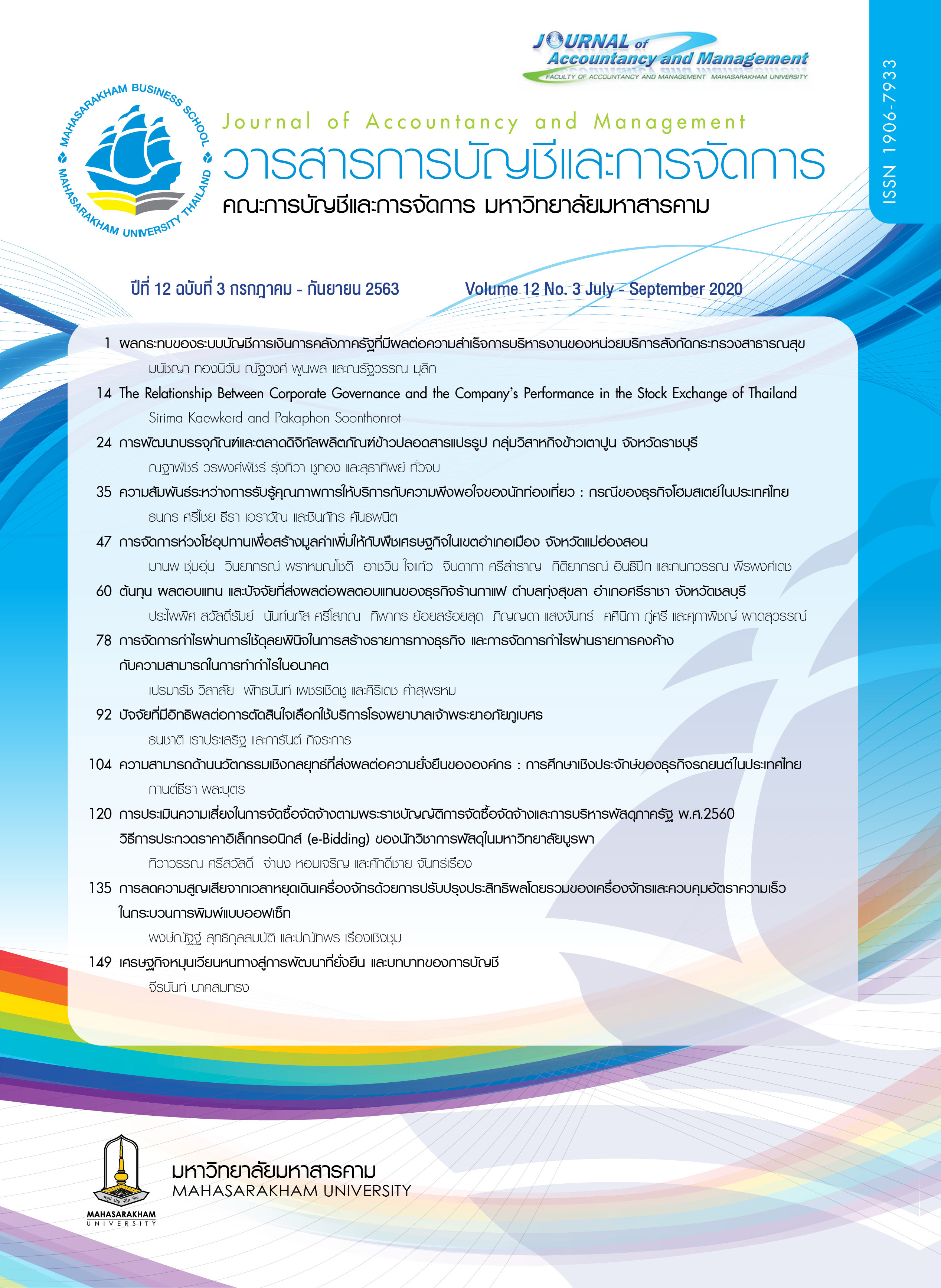การจัดการกำไรผ่านการใช้ดุลยพินิจในการสร้างรายการทางธุรกิจ และการจัดการกำไรผ่านรายการคงค้าง กับความสามารถในการทำกำไรในอนาคต
Main Article Content
บทคัดย่อ
งานวิจัยนี้สะท้อนให้เห็นถึงความสามารถในการทำกำไรในอนาคตขององค์กร โดยพิจารณาความสัมพันธ์กับการจัดการกำไรผ่านการใช้ดุลยพินิจในการสร้างรายการทางธุรกิจและการจัดการกำไรผ่านรายการคงค้างจากค่าผิดปกติจากการประมาณการค่ากระแสเงินสดจากกิจกรรมดำเนินงาน ค่าผิดปกติจากการประมาณค่าค่าใช้จ่ายในดุลยพินิจของผู้บริหารค่าผิดปกติจากการประมาณค่าการสำรองค่าเผื่อหนี้สงสัยจะสูญ ค่าผิดปกติจากการประมาณค่ารายการคงค้าง กลุ่มตัวอย่างใช้เป็นกลุ่มอุตสาหกรรมธุรกิจการเงินของบริษัทจดทะเบียนในตลาดหลักทรัพย์แห่งประเทศไทยจำนวน 51 บริษัท ประชากรทั้งหมด 60 บริษัท และสถิติที่ใช้ในการวิเคราะห์ คือ การวิเคราะห์การถดถอยพหุคูณ ผลการวิจัยพบว่าการจัดการกำไรผ่านการใช้ดุลยพินิจในการสร้างรายการทางธุรกิจพิจารณาจากการประมาณค่าผิดปกติจากกระแสเงินสดจากกิจกรรมดำเนินงานมีความสัมพันธ์ในทิศทางเดียวกันกับความสามารถในการทำกำไรในอนาคต ในทางตรงกันข้ามการประมาณค่าผิดปกติจากค่าใช้จ่ายในดุลยพินิจของผู้บริหารการสำรองค่าเผื่อหนี้สงสัยจะสูญ และการจัดการกำไรผ่านรายการคงค้างมีความสัมพันธ์ในทิศทางตรงกันข้ามกันกับความสามารถในการทำกำไรในอนาคต
Downloads
Article Details
บทความที่ได้รับการตีพิมพ์เป็นลิขสิทธิ์ของวารสารการบัญชีและการจัดการ
ข้อความที่ปรากฏในบทความแต่ละเรื่องในวารสารวิชาการเล่มนี้เป็นความคิดเห็นส่วนตัวของผู้เขียนแต่ละท่านไม่เกี่ยวข้องกับมหาวิทยาลัยมหาสารคาม และคณาจารย์ท่านอื่นๆในมหาวิทยาลัยฯ แต่อย่างใด ความรับผิดชอบองค์ประกอบทั้งหมดของบทความแต่ละเรื่องเป็นของผู้เขียนแต่ละท่าน หากมีความผิดพลาดใดๆ ผู้เขียนแต่ละท่านจะรับผิดชอบบทความของตนเองแต่ผู้เดียว
เอกสารอ้างอิง
ขวัญชนก สุขสนิท. (2559). ลักษณะของผู้บริหารกับการตกแต่งกำไร. การศึกษาค้นคว้าแบบอิสระบัญชีมหาบัณฑิต มหาวิทยาลัยธรรมศาสตร์.
จุฑารัธ พาลพ่าย. (2558). การตกแต่งกำไรในช่วงการเปลี่ยนแปลงประธานเจ้าหน้าที่บริหาร(CEO) กรณีศึกษาบริษัทจดทะเบียนในตลาดหลักทรัพย์แห่งประเทศไทย. การศึกษาค้นคว้าแบบอิสระวิทยาศาสตร์มหาบัณฑิต มหาวิทยาลัยธรรมศาสตร์.
วรวิทย์ เอื้อทรัพย์สกุล. (2552). ผลกระทบจากการเพิ่มขึ้นของการใช้เงินทุนโดยการก่อหนี้ (Leverage) กับการตกแต่งกำไร กรณีศึกษาบริษัทจดทะเบียนในตลาดหลักทรัพย์แห่งประเทศไทย. วิทยานิพนธ์บัญชีมหาบัณฑิต มหาวิทยาลัยธรรมศาสตร์.
อรจิรา ปัญจะเทวคุปต์. (2549). การตกแต่งบัญชีเพื่อประโยชน์ทางภาษีเงินได้นิติบุคคลผ่านบัญชีรายจ่าย. วิทยานิพนธ์บัญชีมหาบัณฑิต มหาวิทยาลัยธรรมศาสตร์.
อาภรณ์ แกล้วทนงค์, พัทธนันท์ เพชรเชิดชู, และศิริเดช คำสุพรหม. (2561). ความสัมพันธ์ระหว่างการเปิดเผยทุนทางปัญญากับคุณภาพกำไรและมูลค่าตามราคาตลาดของบริษัทจดทะเบียนในตลาด หลักทรัพย์แห่งประเทศไทยกลุ่มอุตสาหกรรมเทคโนโลยี. วารสารสุทธิปริทัศน์, 32(102), 98-112.
Alhadab, M., Clacher, I., & Keasey, K. (2015). Real and accrual earnings management and IPO failure risk. Accounting and Business Research, 45(1), 55–92. https://doi.org/10.1080/00014788.2014.969187
Bengtsson, K., Bergström, C., & Nilsson, M. (2007). Earnings Management and CEO Turnovers. Thesis. Stockholm School of Economics, Sweden
Beyer, B.D., Nabar, S.M., & Rapley, E.T. (2018). Real Earnings Management by Benchmark-Beating Firms : Implications for Future Profitability. Accounting Horizons, 32(4), 59-84.
Bhojraj, S., Hribar, P., Picconi, M., & McInnis, J. M. (2009). Making Sense of Cents : An Examination of Firms That Marginally Miss or Beat Analyst Forecasts. The Journal of Finance, 64(5), 2361-2388.
Burgstahler, D., & Dichev, I. (1997). Earnings management to avoid earnings decreases and losses. Journal of Accounting and Economics, 24(1), 99–126.
Burgstahler, D., & Eames, M. (2006). Management of earnings and analysts’ forecasts to achieve zero and small positive earnings surprises. Journal of Business Finance and Accounting, 33(5–6), 633–652.
Chen, J. Z., Rees, L.L., & Sivaramakrishnan, K. (2015). Are All Benchmark Beaters Treated the Same? Accrual-Based Versus Real Earnings Management. Working paper, University of Colorado at Boulder, Texas A&M University, and Rice University.
Cohen, D., Dey, A., & Lys, T. Z. (2008). Real and accrual-based earnings management in the pre- and post-arbanes-Oxley periods. The Accounting Review, 83(3), 757–787. https://doi.org/10.2308/accr.2008.83.3.757
Consioni, S., Colauto, R. D., & Lima, G. A. S. F. D. (2017). Voluntary disclosure and earnings management : evidence from the Brazilian capital market. Revista Contabilidade & Financas, 28(74), 249-263.
Cohen, D. A., & Zarowin, P. (2010). Accrual-based and real earnings management activities around seasoned equity offerings. Journal of Accounting and Economics, 50(1), 2-19.
Dechow, P. M., Kothari, S. P., & Watts, R. L. (1998). The relation between earnings and cash flows. Journal of Accounting and Economics, 25(2), 133–168. https://doi.org/10.1016/S0165-4101(98)00020-2
Dechow, P., & Skinner, D. (2000). Earnings management: Reconciling the views of accounting academics, practitioners, and regulators. Accounting Horizons, 14(2), 235–250. https://doi.org/10.2308/acch.2000.14.2.235
Dechow, P. M., & Dichev, I. D. (2002). The Quality of Accruals and Earnings: The Role of Accrual Estimation Errors. The Accounting Review, 77, 35-59.
Demski, J. S. (1998). Performance Measure Manipulation. Contemporary Accounting Research, 14, 261-285.
Demski, J. S. (2004). Endogenous Expectations. The Accounting Review, 79, 519-539.
Dhaliwal, D. S., Gleason, C. A., & Mills, L. F. (2004). Last-chance earnings management: using the tax expense to meet analysts’ forecasts. Contemporary Accounting Research, 21(2), 431–460.
Dichev, I. D., Graham, J. R., Harvey, C. R., & Rajgopal, S. (2013). Earnings quality: Evidence from the field. Journal of Accounting and Economics, 56(2–3), 1–33. https://doi.org/10.1016/j.jacceco.2013.05.004
Erickson, M., & Wang, S. (1999). Earnings management by acquiring firms in stock for stock mergers. Journal of Accounting and Economics, 27(2), 149-176.
Ewert, R., & Wagenhofer, A. (2005). Economic effects of tightening accounting standards to restrict earnings management. The Accounting Review, 80(4), 1101-1124. https://doi.org/10.2308/accr.2005.80.
Graham, J., Harvey, C., & Rajgopal, S. (2005). The economic implications of corporate financial reporting. Journal of Accounting and Economics, 40, 3-73.
Gunny, K. A. (2010). The relation between earnings management using real activities manipulation and future performance: Evidence from meeting earnings benchmarks. Contemporary Accounting Research, 27(3), 855-888.
Healy, P. M., & Wahlen, J. M. (1999). A review of earnings management literature and its implications for standard setting. Accounting Horizons, 13, 365-383.
Jaggi, B., & Lee, P. (2002). Earnings management response to debt covenant violations and debt restructuring. Journal of Accounting, Auditing & Finance, 17(4), 295–324.
Järvinen, T., & Myllymäki, E. R. (2016). Real Earnings Management before and after Reporting SOX 404 Material Weakness, Accounting Horizons, 30(1), 119 - 141.
Jensen, M. C., & Meckling, W. H. (1976). Theory of the firm: Managerial behavior, agency costs, and ownership structure. Journal of Financial Economics, 3, 305-360.
Jo, H., & Kim, Y. (2007). Disclosure frequency and earnings management. Journal of Financial Economics, 84(2), 561-590.
Kasznik, R. (1999). On the association between voluntary disclosure and earnings management. Journal of Accounting Research, 37, 57–81.
McNichols, M. (2000). Research design issues in earnings management studies. Journal of Accounting and Public Policy, 19, 313–345.
McNichols, M. (2002). Discussion of the quality of accruals and earnings: The role of accrual estimation errors. The Accounting Review, 77, 61–69.
Robb, S. (1998). The Effect of Analysts’ Forecasts on Earnings Management in Financial Institutions, Journal of Financial Research, 21(3), 315-331.
Roychowdhury, S. (2006). Earnings management through real activities manipulation. Journal of Accounting and Economics, 42(3), 335-370.
Scholz, S. (2014). Financial Restatement Trends in the United States : 2003-2012. Retrieved March 22, 2019, from https://www.thecaq.org/wp-content/uploads/2019/03/financial-restatement-trends-in-the-united-states-2003-2012.pdf
Zang, A. Y. (2012). Evidence on the trade-off between real activities manipulation and accrual-based earnings management. The Accounting Review, 87(2), 675–703.
Zhao, Y., Chen, K. H., Zhang, Y., & Davis, M. (2012). Takeover protection and managerial myopia: Evidence from real earnings management. Journal of Accounting and Public Policy, 31(1), 109–135. https://doi.org/10.1016/j.jaccpubpol.2011.08.004


